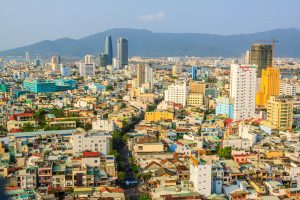In an example of joined-up thinking, Vietnam’s Ministry of Finance last month floated the idea of replacing its blanket 2 percent levy on property sales with something more discriminating: a 20 percent capital gains tax on net profits, or a sliding scale based on how quickly you flip the asset. Sell within two years and you’d hand over 10 percent of your takings. Now, this isn’t some ideological epiphany where the Communist Party of Vietnam suddenly remembered that Marx rather disliked people who get rich from other people’s labor. Singapore already taxes resale profits at a confiscatory 100 percent if you sell within a year; Malaysia, at 30 percent within three. One recent study by Batdongsan, Vietnam’s largest real estate portal, found that 59 percent of Vietnamese respondents said they bought real estate for investment, not for living in, and many plan to sell within a year.
Because I’m a bit of a Georgist, I’m against taxing work and consumption (productive activities), but rather Stalinist when it comes to walloping people who live off rent or unearned capital gains. In my perfect world, you could own as many properties as you liked; you just couldn’t turn the resale of them into a tax-free magic money tree. The capital gains made off the sale of non-primary properties (regardless of the duration of ownership) would be taxed in excess of 50 percent, thus disincentivizing second homeownership. Moreover, a household would only be able to lease out one property, and they’d have to pay exorbitant levies on the proceeds of their landlordism. And I’d impose a hefty tax on the sale of inherited property, too.
The need for some state intervention to control Vietnam’s property market is obvious. Because of speculators and rentiers, home ownership is now a fleeting dream for many Vietnamese. A study by the Vietnam Association of Realtors in February found that the minimum monthly household income required to afford the purchase of a home in Hanoi is $1,770, double the average earnings. According to the CBRE, “workers in Hanoi have even less access to housing than those in Singapore.”
A recent VnExpress survey found that almost half of the respondents have given up on the idea of home ownership due to high prices. Unfortunately for them, rent now consumes 35–50 percent of the income of most Vietnamese. Rents in some parts of Hanoi have gone up by at least a tenth this year.
And yet, property is endlessly described as “a vital growth engine,” a phrase that’s never properly examined because it’s assumed that all growth is good for common prosperity and because most people who shape public opinion are personally invested in the property market. (If a professor, journalist, or politician had shares in a company and continually talked it up in public, you’d quite rightly suspect they were talking their own book. But they constantly do the same with the property sector and nobody bats an eyelid.) Indeed, it’s scarcely ever debated whether it’s desirable that property prices keep on rising, yet we don’t celebrate rising oil or food prices in the same way. And who questions why property is almost entirely seen as an investment and an asset, not a form of consumption? My suspicion is that most of the economic gains the average Vietnamese has made since 1986 have been mopped up by the property Ponzi scheme.
One reason Hanoi is pontificating on bold new taxes, including on property, is that the government must massively increase revenue to pay for a swelling elderly population and a dwindling workforce. Indeed, we’re going to be hearing a lot more about Vietnam’s demographic crisis in the coming years. Almost certainly, the poor, who mostly work in productive industries that benefit the community, are going to have to pay much more than they’re used to. Why not people who are fortunate enough to have purchased a home 10 or 20 years ago and are now sitting on $150,000 unearned capital gains? Or, indeed, the speculators who buy and sell apartments with associates and then profit from the artificially inflated prices they’ve conspired to create?
However, Vietnam’s demographic crisis isn’t fundamentally about fewer working-age adults to produce stuff or the government having to cover more of the costs of retirees. On the production side, you can mitigate a shortfall in workers by automation or by bringing in migrants. It’s consumption that really matters. Computers don’t purchase things, and migrant workers tend to send much of their money home. For now, countries like Vietnam can rely on offshoring consumption (exports). Eventually, though, the country will need its own citizens to spend more at home. If you’re a national planner, would you want a majority of Vietnamese to be paying most of their wages on ever-rising mortgage repayments or rents, or would you rather them having far more disposable income to spend on Vietnamese-made goods and services? Do you want your dwindling workforce to be increasingly indebted to a class of people who inflate their wealth from the work of others, or do you want more people to be able to afford to spend more on their parents’ care or local businesses?
Alas, after a meeting of the Vietnamese government on August 2, Deputy Finance Minister Cao Anh Tuan announced that the new property tax idea would likely be dropped. The ostensible reason is that Vietnam lacks a functioning real estate database. This is undoubtedly true, and without one, it would be impossible for the authorities to track the timing of all property purchases and the associated costs, information essential for taxing capital gains. But what’s the point of a one-party, Leninist autocracy if it can’t coerce people into telling you such things? If only rentierism was policed with the same zeal as political gossip.

































